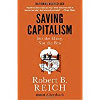
In 1928, famed British economist John Maynard Keynes predicted that technology would advance so far in a hundred years – by 2028 – that it will replace all work, and no one will need to worry about making money.
“For the first time since his creation man will be faced with his real, his permanent problem – how to use his freedom from pressing economic cares, how to occupy the leisure, which science and compound interest will have won for him, to live wisely and agreeably and well.”
We still have thirteen years to go before we reach Keynes’ prophetic year, but we’re not exactly on the way to it. Americans are working harder than ever.
Keynes may be proven right about technological progress. We’re on the verge of 3-D printing, driverless cars, delivery drones, and robots that can serve us coffee in the morning and make our beds.
But he overlooked one big question: How to redistribute the profits from these marvelous labor-saving inventions, so we’ll have the money to buy the free time they provide?
Without such a mechanism, most of us are condemned to work ever harder in order to compensate for lost earnings due to the labor-replacing technologies.
Such technologies are even replacing knowledge workers – a big reason why college degrees no longer deliver steadily higher wages and larger shares of the economic pie.
Since 2000, the vast majority of college graduates have seen little or no income gains.
The economic model that predominated through most of the twentieth century was mass production by many, for mass consumption by many.
But the model we’re rushing toward is unlimited production by a handful, for consumption by the few able to afford it.
The ratio of employees to customers is already dropping to mind-boggling lows.
When Facebook purchased the messaging company WhatsApp for $19 billion last year, WhatsApp had fifty-five employees serving 450 million customers.
When more and more can be done by fewer and fewer people, profits go to an ever-smaller circle of executives and owner-investors. WhatsApp’s young co-founder and CEO, Jan Koum, got $6.8 billion in the deal.
This in turn will leave the rest of us with fewer well-paying jobs and less money to buy what can be produced, as we’re pushed into the low-paying personal service sector of the economy.
Which will also mean fewer profits for the handful of billionaire executives and owner-investors, because potential consumers won’t be able to afford what they’re selling.
What to do? We might try to levy a gigantic tax on the incomes of the billionaire winners and redistribute their winnings to everyone else. But even if politically feasible, the winners will be tempted to store their winnings abroad – or expatriate.
Suppose we look instead at the patents and trademarks by which government protects all these new inventions.
Such government protections determine what these inventions are worth. If patents lasted only three years instead of the current twenty, for example, What’sApp would be worth a small fraction of $19 billion – because after three years anybody could reproduce its messaging technology for free.
Instead of shortening the patent period, how about giving every citizen a share of the profits from all patents and trademarks government protects? It would be a condition for receiving such protection.
Say, for example, 20 percent of all such profits were split equally among all citizens, starting the month they turn eighteen.
In effect, this would be a basic minimum income for everyone.
The sum would be enough to ensure everyone a minimally decent standard of living – including money to buy the technologies that would free them up from the necessity of working.
Anyone wishing to supplement their basic minimum could of course choose to work – even though, as noted, most jobs will pay modestly.
This outcome would also be good for the handful of billionaire executives and owner-investors, because it would ensure they have customers with enough money to buy their labor-saving gadgets.
Such a basic minimum would allow people to pursue whatever arts or avocations provide them with meaning, thereby enabling society to enjoy the fruits of such artistry or voluntary efforts.
We would thereby create the kind of society John Maynard Keynes predicted we’d achieve by 2028 – an age of technological abundance in which no one will need to work.
Happy Labor Day.
About the Author
 ROBERT B. REICH, Chancellor’s Professor of Public Policy at the University of California at Berkeley, was Secretary of Labor in the Clinton administration. Time Magazine named him one of the ten most effective cabinet secretaries of the last century. He has written thirteen books, including the best sellers “Aftershock" and “The Work of Nations." His latest, "Beyond Outrage," is now out in paperback. He is also a founding editor of the American Prospect magazine and chairman of Common Cause.
ROBERT B. REICH, Chancellor’s Professor of Public Policy at the University of California at Berkeley, was Secretary of Labor in the Clinton administration. Time Magazine named him one of the ten most effective cabinet secretaries of the last century. He has written thirteen books, including the best sellers “Aftershock" and “The Work of Nations." His latest, "Beyond Outrage," is now out in paperback. He is also a founding editor of the American Prospect magazine and chairman of Common Cause.
Books by Robert Reich
Saving Capitalism: For the Many, Not the Few -- by Robert B. Reich
 America was once celebrated for and defined by its large and prosperous middle class. Now, this middle class is shrinking, a new oligarchy is rising, and the country faces its greatest wealth disparity in eighty years. Why is the economic system that made America strong suddenly failing us, and how can it be fixed?
America was once celebrated for and defined by its large and prosperous middle class. Now, this middle class is shrinking, a new oligarchy is rising, and the country faces its greatest wealth disparity in eighty years. Why is the economic system that made America strong suddenly failing us, and how can it be fixed?
Click here for more info or to order this book on Amazon.
Beyond Outrage: What has gone wrong with our economy and our democracy, and how to fix it -- by Robert B. Reich
 In this timely book, Robert B. Reich argues that nothing good happens in Washington unless citizens are energized and organized to make sure Washington acts in the public good. The first step is to see the big picture. Beyond Outrage connects the dots, showing why the increasing share of income and wealth going to the top has hobbled jobs and growth for everyone else, undermining our democracy; caused Americans to become increasingly cynical about public life; and turned many Americans against one another. He also explains why the proposals of the “regressive right” are dead wrong and provides a clear roadmap of what must be done instead. Here’s a plan for action for everyone who cares about the future of America.
In this timely book, Robert B. Reich argues that nothing good happens in Washington unless citizens are energized and organized to make sure Washington acts in the public good. The first step is to see the big picture. Beyond Outrage connects the dots, showing why the increasing share of income and wealth going to the top has hobbled jobs and growth for everyone else, undermining our democracy; caused Americans to become increasingly cynical about public life; and turned many Americans against one another. He also explains why the proposals of the “regressive right” are dead wrong and provides a clear roadmap of what must be done instead. Here’s a plan for action for everyone who cares about the future of America.
Click here for more info or to order this book on Amazon.
Related Book:
at

Thanks for visiting InnerSelf.com, where there are 20,000+ life-altering articles promoting "New Attitudes and New Possibilities." All articles are translated into 30+ languages. Subscribe to InnerSelf Magazine, published weekly, and Marie T Russell's Daily Inspiration. InnerSelf Magazine has been published since 1985.

Thanks for visiting InnerSelf.com, where there are 20,000+ life-altering articles promoting "New Attitudes and New Possibilities." All articles are translated into 30+ languages. Subscribe to InnerSelf Magazine, published weekly, and Marie T Russell's Daily Inspiration. InnerSelf Magazine has been published since 1985.





























